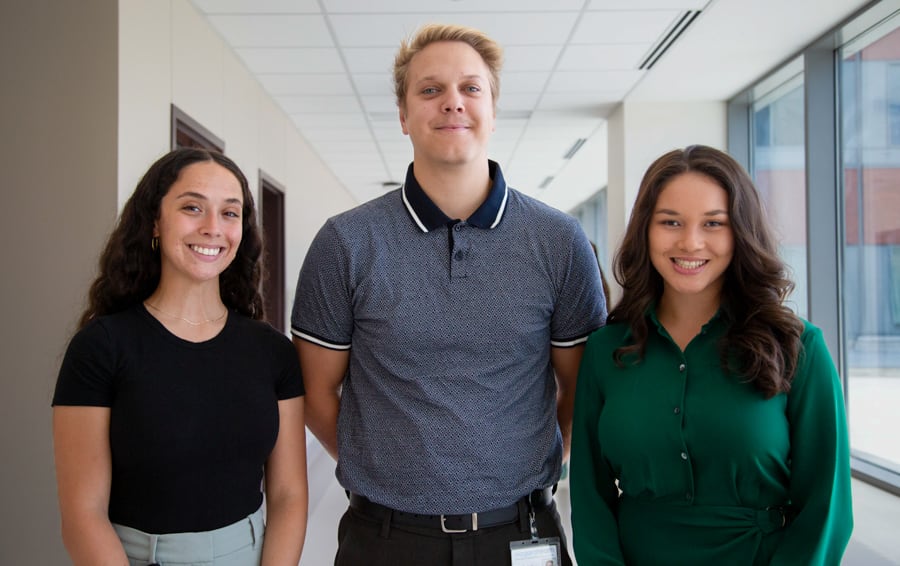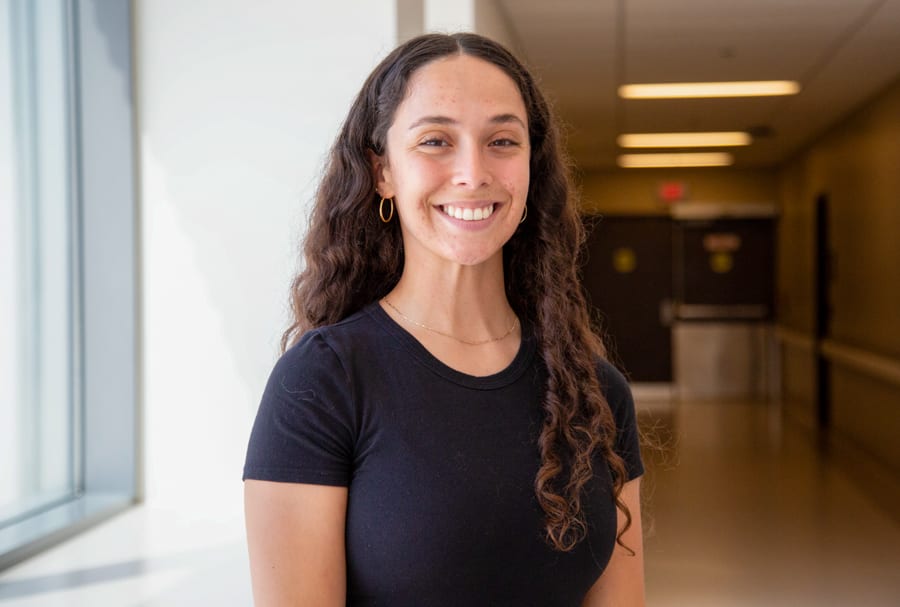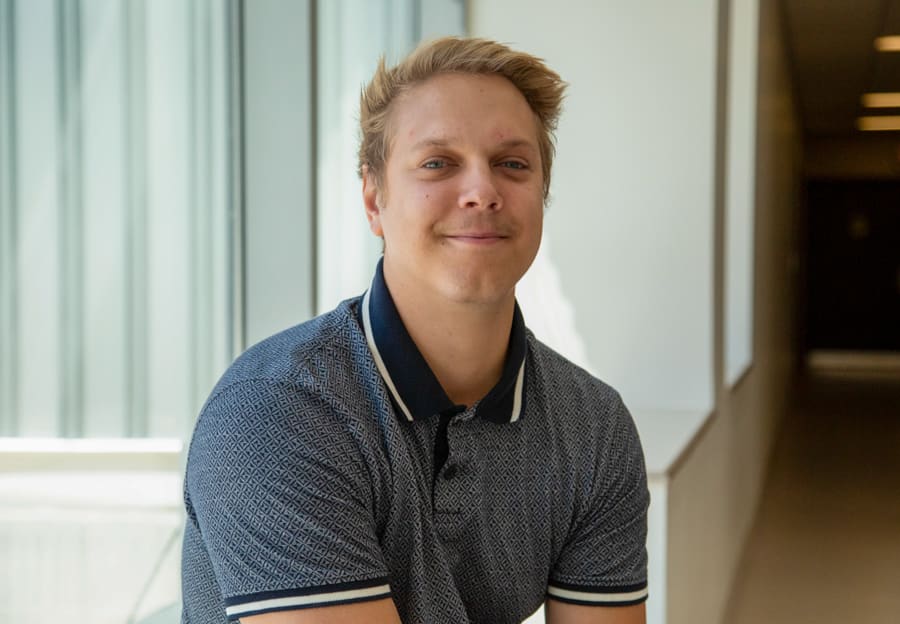The research we conduct at Niagara Health has a profound impact on the health and well-being of our patients and communities, and contributes to better understanding some of the most significant healthcare challenges of our time with the potential to benefit patients in Niagara and across Canada.

From left: Alessandra Giglia, Zachary Raczywolski and Milaina Wong are the inaugural recipients of the Niagara Health Knowledge Institute Scholarships in partnership with the Thrombosis and Atherosclerosis Research Institute, Niagara College and Brock University.
Research at Niagara Health got a boost this summer, thanks to three summer students, who earned scholarships to work with the Niagara Health Knowledge Institute (NHKI).
Milaina Wong, Zachary Raczywolski and Alessandra Giglia have spent the past 12 weeks lending their skills to moving the needle on NHKI studies that could change patient care for the better and advance healthcare research capacity throughout Canada.
“The students brought new energy, ideas and perspectives to our work, which is important for continuing the generate and mobilize healthcare knowledge,” says Elaina Orlando, NHKI Research Manager.
The trio are the first to receive the NHKI scholarships, worth $10,000 each. The awards were jointly funded by the NHKI, Brock University, Niagara College and the Thrombosis and Atherosclerosis Research Institute (TaARI) with the aim of retaining high-potential students within Niagara while contributing to the overall growth of the NHKI.
“The scholarships also ensure we’re committing to our pillar of building research capacity by investing in learners and creating a pipeline for recruiting top local talent,” Orlando says.
As they wind down their tenure, the students reflected on their experiences and how they’ve been impacted by the work they’ve done so far at Niagara Health.

Alessandra Giglia is a McMaster University life sciences student. She received the Niagara Health Knowledge Institute and Thrombosis and Atherosclerosis Research Institute Summer Student Scholarship.
Alessandra Giglia
Niagara Health Knowledge Institute and Thrombosis and Atherosclerosis Research Institute Summer Student Scholarship recipient
Alessandra Giglia had a case of the jitters when she stepped into the Thrombosis and Atherosclerosis Research Institute (TaARI) Liaw Lab on Day 1 of her scholarship term in May.
It wasn’t her first time in the lab. The fourth-year life sciences student at McMaster University had just wrapped up a work term there but the NHKI-TaARI scholarship was Giglia’s first chance to delve into clinical research and learn about the workings of a community hospital.
“When I started, it was, ‘Oh, I don’t feel confident’ and I was watching people do things, which is a normal, healthy part of doing a job,” Giglia recalls.
These days, Giglia, whose work contributed to understanding the effects of sepsis on vulnerable older populations, and potential therapeutics, is the person familiarizing summer co-op students with tasks and filling in gaps for the part-time placements.
“Knowing that I’m gaining skills and being able to contribute meaningfully has been the most satisfying part of this for me,” she says. “Just to watch people do something and then being able to do it myself, it’s ‘Oh, wow, this is really neat.”
So much so that Giglia, who has always been interested in medicine from a research perspective and “understanding why something is happening,” will continue at the Liaw Lab in the fall when she begins working on her honours thesis.
“It doesn’t end here. I get to come back for another year. It’s nice to be continuing to build off of what I started,” she says. “I want to continue learning about immunology. There are a lot of life sciences students in pre-med, which is admirable, but I’m interested in the research side and staying on that trajectory.”
She’s also fascinated by something else: the impact that her scholarship work at TaARI could have on healthcare.
“It’s nice to know this work can have real-world applications and help people, and there’s the possibility of influencing clinical practice,” Giglia says. “It’s the ability to help patients combined with ‘Wow, this is so cool.’ I also happen to enjoy it. It’s fulfilling in that sense.”

Zachary Raczywolski is the recipient of the Niagara Health Knowledge Insitute and Niagara College Summer Student Research Scholarship.
Zachary Raczywolski
Niagara Health Knowledge Institute and Niagara College Summer Student Research Scholarship recipient
Sometimes even research needs to be researched.
Zachary Raczywolski has been doing just that since starting his scholarship term with the NHKI. Over the past 12 weeks, the second-year paramedic student at Niagara College has been comparing the research output and capacity of Canadian community hospitals to their academic counterparts, and determining how to get more community hospitals involved in advancing healthcare research.
“We know there are barriers – financial barriers, staffing barriers. You need quality staff to do research but you also need funding to do research,” Raczywolski says.
Meanwhile, most Canadians receive care at community hospitals, making them prime research facilities in addition to healthcare institutions. Maybe community hospitals could partner with academic hospitals, Raczywolski muses. That would expand academic hospitals’ reach to a larger, more diverse patient population, while getting smaller hospitals involved in practice-changing research.
“A multi-system approach could be beneficial to both community and academic hospitals,” he says. “There’s really a need for this so I appreciate the application of this research.”
Raczywolski is no stranger to doing deep dives into a topic. Before enrolling at Niagara College, he completed his master’s degree in biochemistry, earning scholarships and doing research in the process.
He always wanted to be a paramedic for the everyday differences he could make in people’s lives – something he didn’t experience while toiling in a biochemistry lab. Still, research has always played a pivotal role in his education so when the NHKI-Niagara College scholarship was announced, Raczywolski was eager to apply.
“I want to make sure I have as much knowledge of Canada’s healthcare system as possible,” he says. “I thought it would be beneficial since I’ll be the first point of contact (as a paramedic) for people entering the healthcare system.”
This is Raczywolski’s first foray into applied research, which has become an important part of Niagara College’s brand. As he prepares for his final year of college, he’s not sure when he’ll have an opportunity like this again. That’s why he’s considering staying on as a research volunteer.
“I feel very fortunate working on this,” Raczywolski says. “It’s something I’m passionate about, too – giving people more access to healthcare and having them benefit from the healthcare system, so it’s definitely a great experience to be part of.”

Milaina Wong is the recipient of the Niagara Health Knowledge Institute and Brock University Summer Student Research Scholarship.
Milaina Wong
Niagara Health Knowledge Institute and Brock University Summer Student Research Scholarship recipient
Milaina Wong knew providing the best patient care possible was an honourable endeavour long before stepping into a medical sciences classroom at Brock University.
In high school, the St. Catharines native took every science class she could with the hope of one day being able to help people in their most vulnerable moments.
“Everyone is a patient at some point in their life, so being able to receive personalized support as they go through that experience, is an invaluable part of quality healthcare,” Wong says. “I’ve seen family members and friends and how their interaction with healthcare can influence their decisions to return to a particular healthcare provider. Patients are more than just a number, so trying to change that perspective is really important to me.”
It was fitting that she spent the summer working on a scoping review to prepare for a study about music therapy as an effective method of care for patients with dementia who are experiencing behavioural and psychological symptoms of dementia when presenting to the Emergency Department (ED).
Wong has learned about the implications of aging populations on healthcare at school, where she’s in her fourth year. But “being involved in a study that’s really applicable to the community is fascinating to me.”
Music therapy as a care option has several benefits, including being low cost and non-pharmacological. Wong has been working closely with Niagara Health’s geriatrics team and has had opportunities to observe how nurse practitioners on the Geriatric Emergency Management team work in the ED.
“I feel fortunate that (Complex Care and Geriatrics Director) Lori MacCullouch and (Research Manager) Elaina Orlando entrusted me to take part in launching this study,” Wong says. “I wouldn’t have had the opportunity otherwise. With this research being so promising, you can see an end goal, which is encouraging.”
With the end in sight for her degree, Wong has gained new insight into what she’d like to do in her career thanks to her NHKI-Brock University scholarship.
“Gaining exposure to the geriatric demographic has been eye-opening for me,” she says. “It’s solidified my desire to pursue a career in healthcare. After gaining exposure to the input someone can have at the research level, and the invaluable role of the nurse practitioners in patient care throughout someone’s lifespan, I’ve developed a broader perspective about the various facets of healthcare.”

